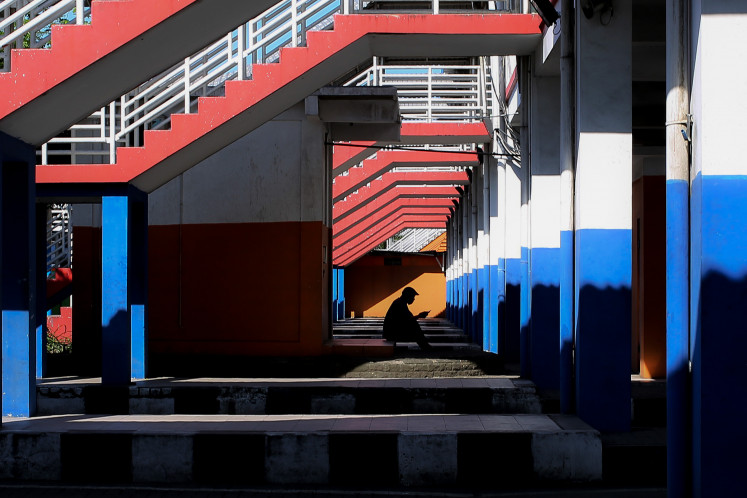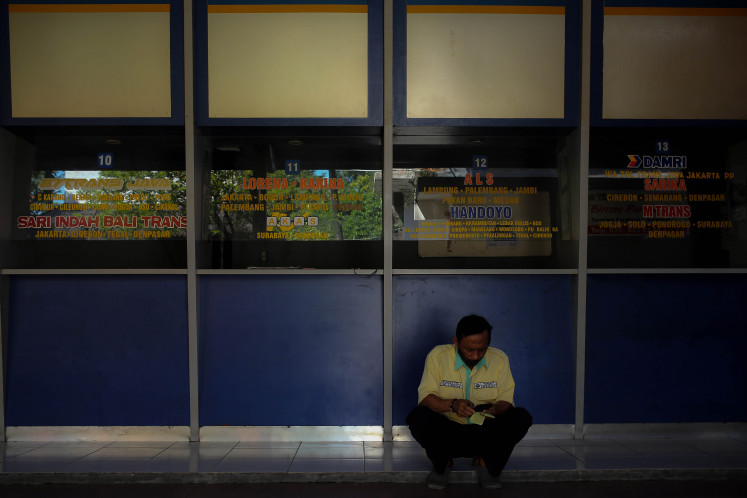No income and no reunions: Transportation industry workers lament travel ban
Workers who rely on the mudik travel season for an annual income boost are caught between a rock and a hard place - making much less than usual yet unable to go home to be with their families. They tell The Jakarta Post of their frustration.
Change text size
Gift Premium Articles
to Anyone

T
he sound of the takbiran (eve of Idul Fitri celebrations) reverberated as the sun slowly leaned toward the west. Minutes before dusk, the usually-bustling Bungurasih terminal right outside Surabaya was still quiet. Occasionally, ticket brokers could be seen moving from one area to another, but almost all returned empty-handed. Bus drivers were just sitting around, some chatting and some in silence, while others had fallen asleep in the open luggage compartments of their vehicles.
It was one day before Idul Fitri, usually the peak of people traveling to the places they hail from for family reunions, but the government’s decree prohibiting the mudik (exodus) this year means most transportation providers are sitting on their hands. Drivers, brokers and travel agents are left with far less income while also not being able to return home.
Toni, a 35-year-old bus driver who operates out of Bungurasih, said he felt “trapped”. Toni originates from Malang, a city located 45 kilometers south of Surabaya. He could not go home to be with his wife and children, since every corner of the city was heavily guarded. But he’s also low on cash. Only a quarter of the seats on the bus he drives are taken, at a time of year when the vehicle would normally be packed. Toni's income could only cover his food and gas expenses. His eyes turned red as he told the Post that, this year, he couldn't buy new clothes for his children.
"I’ve recently seen how this country is getting more and more unfair to common people like us. The policy, you know, doesn't make sense. If I can’t find any means [for living] for my family, at least don’t make our life more difficult. If we can’t be on the road, at least give us subsidies. Provide a solution, don't just forbid and prohibit the public [from working]," Toni said.
The limitations have left people with mudik-reliant professions in disarray, because most bus and shuttle bus drivers do not work for a monthly salary. Their income depends on the number of passengers. Toni said that his pay this year is 17 percent of the total income he generates.
"Last year was not so bad. [The rules] weren’t so tight. Even until Idul Fitri, I was still there on the road. This year was an absolute downer" Toni said.
Looking on the bright side
Ardi, a 32-year-old bus driver who plies the route between Surabaya and Ponorogo, laments the same thing. He said his company had lowered payments for employees, giving them only 7 percent of each occupied seat instead of the usual 17 percent. Ardi could do nothing but accept the policy. Because of the company’s financial challenges, employees also weren't given the usual yearly religious holiday allowance (THR).
"Things are more fortunate for those who still get a THR even though they're not on the road. I get none of it. It's an important thing for us -- an additional fee we can use to keep going in life. I always send my income back to my village.” Ardi said.
Still, he tries to look at the bright side.
“I don’t mind at all as long as my wife and children can celebrate Eid. To be happy is a simple matter for me as the head of the family. If my family can have fun, then I am content. My struggle here is one thing that they don't need to know.”

When he was a driver, Ardi usually pocketed around Rp 200,000 each route with a full bus. He usually made three or four round trips a day, averaging him about Rp 500,000 or Rp 600,000 a day.
"As a bus conductor, you'd feel grateful just receiving Rp 100,000," explained Ardi.
Just like Toni, Ardi calls the homecoming regulation a “trick” by the government. He feels “furious” and sees a government incapable of handling the pandemic.
Stuck at work
52-year-old Wahyudi has spent half of his life at the terminal, selling tickets for interprovincial bus rides. He calls 2021 “the worst year of [his] life”. Idul Fitri is usually the time when he makes bank, but not this year.
"Before the pandemic hit, Idul Fitri always left me exhausted, because I was busy serving so many passengers; helping to carry their luggage and all. But it is always such a relief, because the money was worth it. This year it's been lousy. Instead of being tired of serving passengers, I’m tired of waiting for their arrival. Sometimes at times like this I think to myself, how fortunate it would be to be a civil servant with a guaranteed salary,” said Wahyudi, laughing.

The agency where Wahyudi works actually has an operating permit, but instead of being grateful, he tells the Post that he wished that the company had not been given it. That way, he could take two weeks off — an opportunity he has never had so far — and be reunited with his grandchildren at home.
"It's useless. I have to keep going [to work], but I have nothing to work on. It'd be better if I could take a day off and lay back at home. I miss my grandchildren,” he sighed.
Wahyudi revealed that the agency had agreed to dismiss all employees from May 6 to 17, 2021. However, when he had already packed and was ready to go home, the manager called him. He told Wahyudi that their agency had just received an operating permit.
"I was half-hearted, but I couldn’t refuse. If I get fired, what can I do? I'm already this old, and I still need to support my family. One of my children, my daughter, was abandoned by her husband and now lives with me again. I have to provide for my children and grandchildren," he said.
Wahyudi admitted that he had not celebrated Idul Fitri twice with his beloved family in Madiun. Last year, even though he couldn't see them, he could still send them some money. This year, the conditions are very different. Wahyudi could only send enough money for his family to cook simple traditional snacks. It would not be enough for new clothes like last year.
"This year the fasting season felt long. We had to hold off on a lot of things, [feeling hungry, cashless and homesick] but this is the consequence of being a man. Someday when you become fathers, when you become the heads of families, you’ll see it for yourselves."









